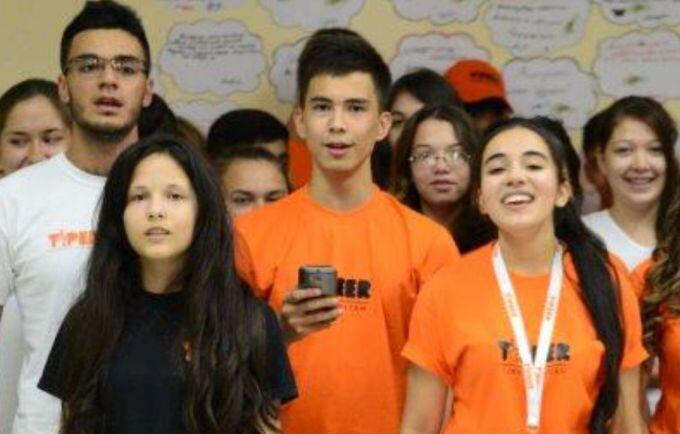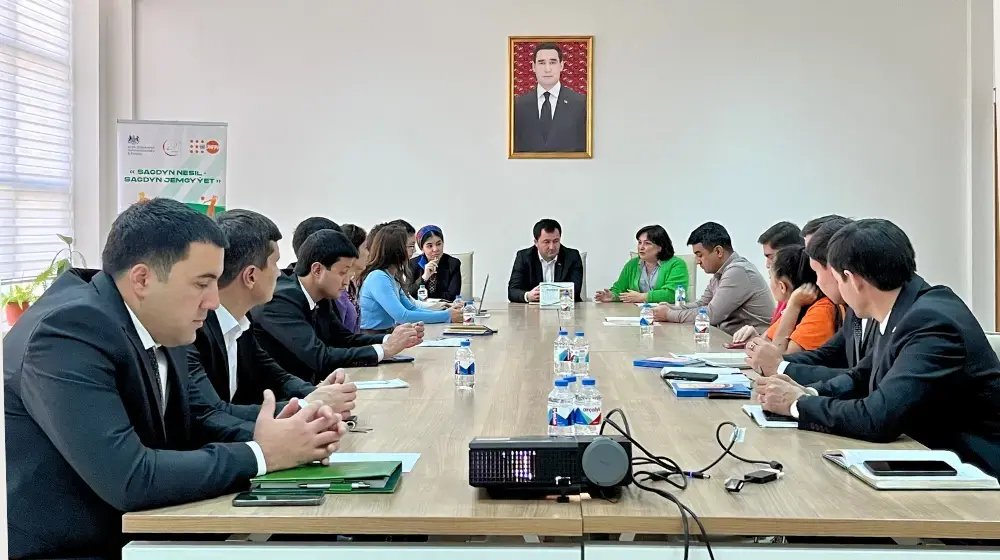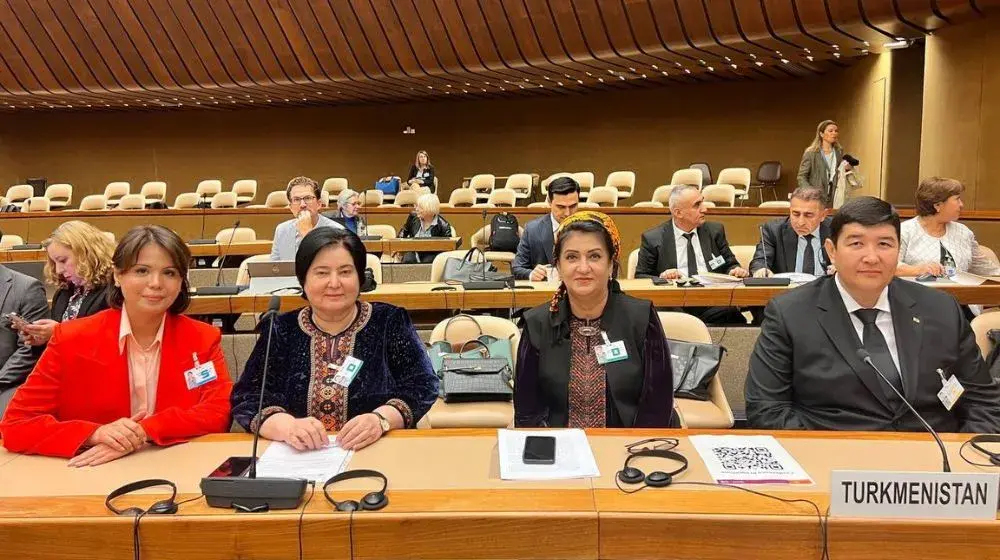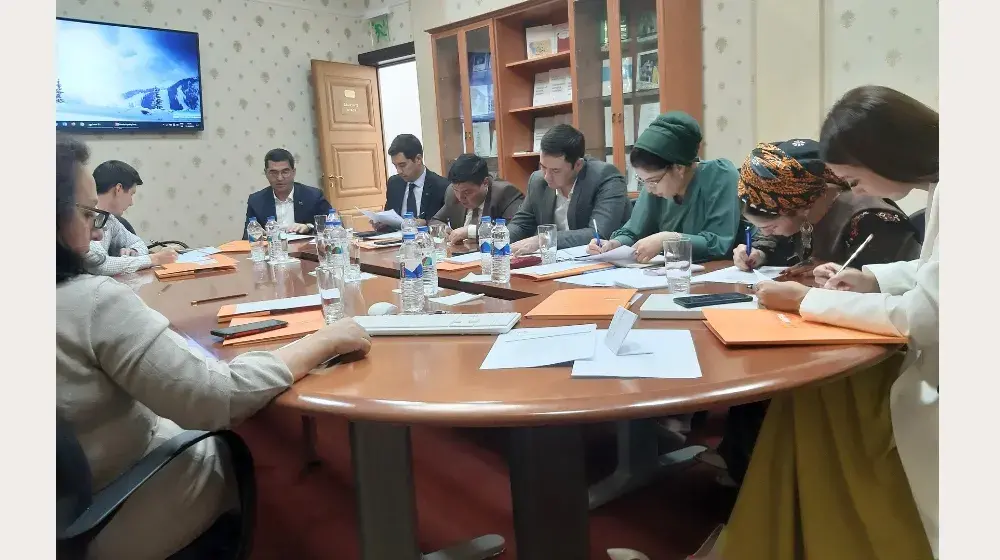Eziz is an emerging leader in his class. His classmates respect his views and follow his example of leading a healthy lifestyle. Parents and teachers of Eziz have also noticed that lately the 15-year old has become more independent, responsible and motivated to learn new things and discover new horizons.
Eziz has become a Y-PEER volunteer, a member of the Youth Peer Education Network in Turkmenistan dedicated to promoting healthy living and gender equality among peers.
Last year he called the local teen hotline to share his concerns about his insecurities and future, and he was referred to the newly established Youth center in Ashgabat, a program led by the Ministry of Education of Turkmenistan. This is the second Youth center in the capital, in addition to the active center led by Youth Organization of Turkmenistan named after Magtymguly. Both centers are supported by UNFPA, the United Nations Population Fund.
The Youth centers host the Y-PEER activities and welcome dozens of adolescents and young people daily and empower them with knowledge and skills to make healthy choices.
A wave of the young visitors continue to discover that health education can actually be fun when it is taught by peers through interactive games and sessions on such serious topics as prevention of bad habits, sexually transmitted diseases, including HIV, unintended pregnancy and gender-based violence.
“Adolescence represents one of the critical transitions in the life span,” said Bayramgul Garabayeva, UNFPA Assistant Representative. “Many serious diseases in adulthood have their roots in adolescence. 2/3 of premature deaths among adults and 1/3 of the burden of disease are associated with conditions or behavior that began during adolescence. Having the correct information in hands is indispensable to make healthy and responsible choices, in addition to having youth-friendly health services and evidence-based youth policies.”
That is the reason why UNFPA recognizes peer-to-peer approach as one of the most effective techniques for teaching life skills to young people. It is based on a theory that young people are more likely to discuss issues related to adolescent reproductive health with their peers.
In a focus group discussion conducted by UNFPA in the capital and one of the velayats (regions) young people noted that when they have questions about their growing body, emotions and relationships, they rarely turn to parents and/or other adults, but talk to their friends or visit Internet sites. Both sources often fail providing accurate and complete information on adolescent reproductive health. Well-constructed peer-to-peer activities led by specially trained master-trainers within the network allow young people to be better informed on healthy living.
Y-PEER volunteers lead series of events and campaigns throughout the year at the Youth centers, secondary schools, public spaces and summer camps. They get a chance to meet with the Members of Mejlis (Parliament) of Turkmenistan and voice the concerns and ideas of the Turkmen youth. Inspirational meetings with the Turkmen national poets, writers and prominent people are regularly held at the centers. Annual Leadership and Advocacy School allows the young leaders to discover their leadership, intellectual and creative potential.
“There is a sharp difference between the shy boy who first walked into our Youth center and one of the most active Y-PEER volunteers today,” said Maya Meretkuliyeva, the youth center coordinator. “It is such a pleasure to see how much Eziz has grown and matured as an individual and as a leader.”
Eziz admits that before coming to the Youth center, he experimented with smoking because of the peer pressure that has started at school. “Y-PEER activities changed my life – they were convincing, they were inspirational and empowering,” said Eziz. “The sessions on risks of bad habits and effect on our health, reproductive health and many aspects of life, as well as the interactive games on ability to say “No!” and on decision-making skills, have really pushed me to believe in myself and release me from the nicotine ties. I did it. I quit smoking.”
Empowered, Eziz helped several boys and girls at the center and in his school to escape bad habits. He actively shares his experience during the sessions on healthy lifestyle, and serves as a role model for his peers.
“Aspiration to fulfil a dream and to achieve something desired, to bring to life something significant is very meaningful for us, young people,” said Alisher, Y-PEER volunteer. “Bright examples of real people who managed to achieve the set target despite the difficulties and pressure is inspiring. Fellow classmates and Y-PEER volunteers like Eziz are like a lighthouse for us, they help us to stay strong and make healthy choices in any situations.”
***
Please encourage your adolescent family members and friends to visit the Peer Education Youth centers at the following addresses:
Youth Center of the Youth Organization of Turkmenistan: B. Garryev str., 67, Ashgabat, Turkmenistan.
Youth Center at the Mary branch of Youth Organization of Turkmenistan: Gurbansoltan eje str., 83, Mary, Turkmenistan; telephone number: +(993522) 7-12-32.
Working Hours and Time: Monday-Friday, 09:00-18:00





